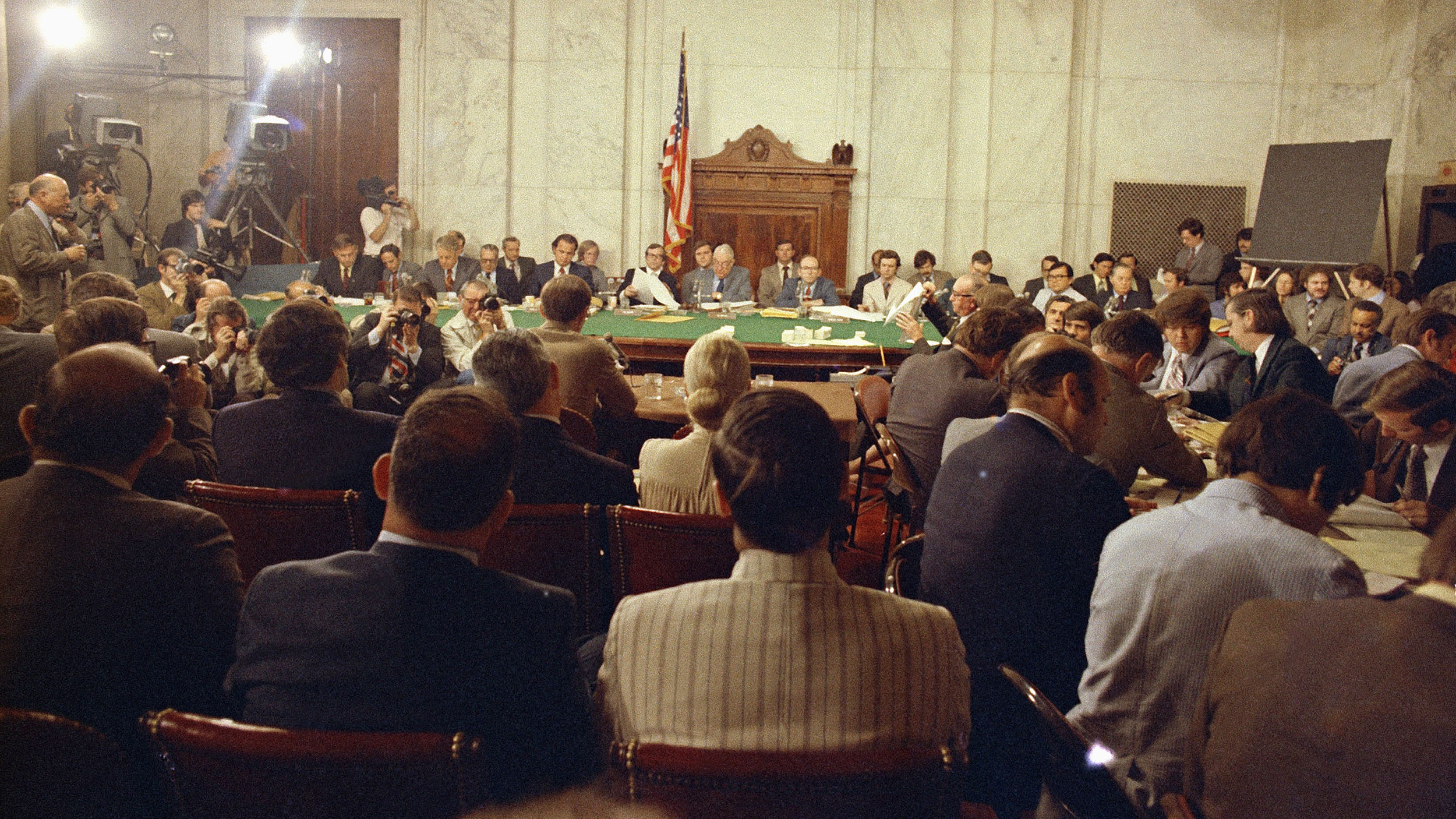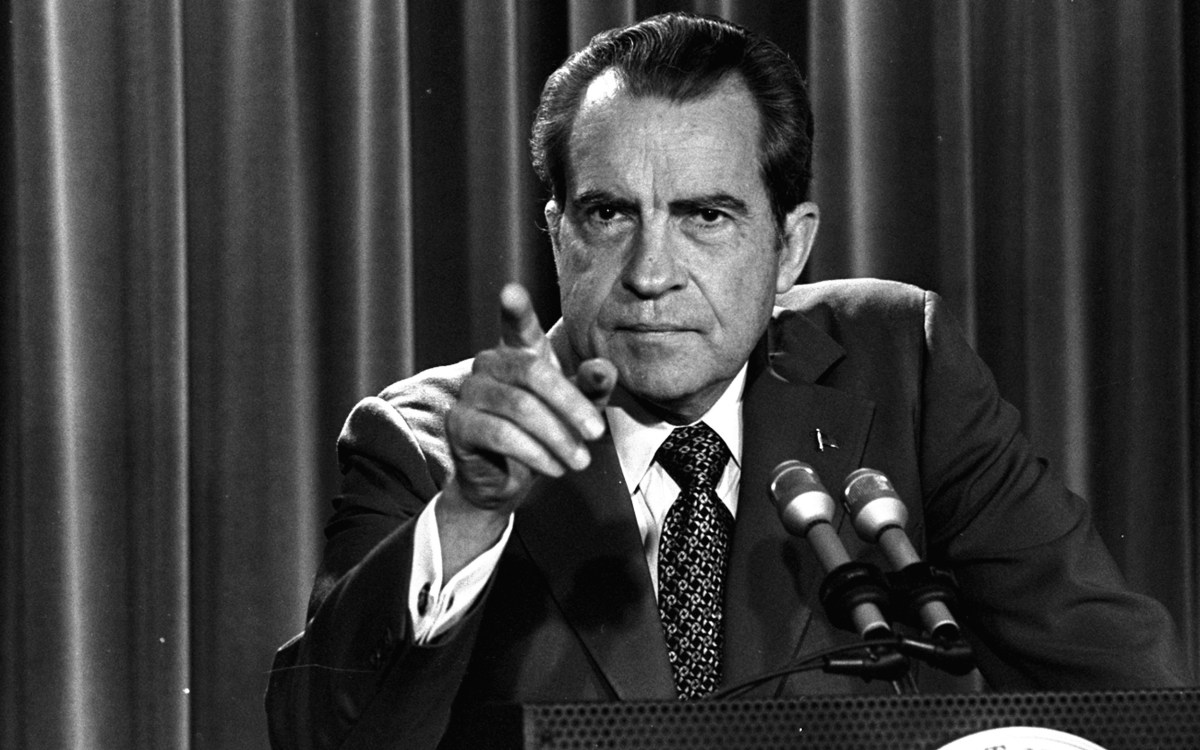
Alum Samuel Ervin Jr. leads a hearing by the Senate Select Committee on Presidential Campaign Activities, more commonly known as the Watergate committee, in May 1973.
AP file photo
Watergate through a Harvard lens
College, Law School helped shape key investigators, other important figures
Watergate, which started with a break-in at the headquarters of the Democratic National Committee 50 years ago this month, turned a panoply of relatively obscure lawmakers, lawyers, and legal scholars into national celebrities. Many of the most well-known came from Harvard Law School at the urging of Congress to investigate President Nixon and his administration. But many other important players in the saga had Harvard connections. Here are some of the most noteworthy:
Materials from published news articles, interviews, and “Watergate: A New History” by Garrett Graff.

Benjamin Bradlee ’42
Executive Editor, The Washington Post
Approved pursuit and publication of Watergate story.

Archibald Cox ’34, LL.B. ’37
Appointed special prosecutor to investigate Watergate break-in
After Cox issued subpoena to Nixon seeking White House tapes, Nixon ordered Attorney General Elliot Richardson, then Deputy Attorney General William Ruckelshaus to fire Cox in the infamous “Saturday Night Massacre.” Solicitor General Robert Bork would do so as the newly promoted acting attorney general.

Samuel Dash, LL.B. ’50
Chief counsel to Senate Watergate committee
Under his direct questioning, Nixon deputy assistant Alexander Butterfield confirmed the existence of White House taping system.

Evan A. Davis ‘66
Attorney for House Judiciary Committee impeachment inquiry
Led team that investigated and gathered evidence of the Watergate break-in and cover-up.

David W. Dennis, LL.B. ’36
Served on House Judiciary Committee
A staunch Nixon defender, he voted against impeachment, but after learning of “smoking gun” tapes, said he had changed his mind, calling Nixon’s actions “indefensible.”

Samuel Ervin Jr., LL.B. ’23
Chairman of the Senate Watergate committee

Hamilton Fish IV ’49
Served on House Judiciary Committee
Part of the “fragile coalition” of Republicans on the House Judiciary to come around and vote to impeach Nixon.

James Flug ’59, LL.B. ’63
Chief Counsel to Senate Judiciary Committee
Flug also investigated the ITT Corp. scandal, in which Nixon ordered the Justice Department to settle its antitrust lawsuit with ITT in exchange for a $400,000 contribution from the company to the 1972 Republican National Convention.

David Gergen, LL.B. ’67
Staff assistant to the president, White House speechwriter
Drafted Nixon’s Aug. 9, 1974, resignation letter.

Edward J. Gurney, LL.B. ’38
Served on the Senate Watergate committee
Florida Republican was Nixon’s top defender on the committee.

Philip B. Heymann, LL.B. ’60
Assistant to Special Prosecutor Cox
Investigated White House “plumbers,” secured conviction of top Nixon aide John Ehrlichman.

Terry Lenzner ’61, LL.B. ’64
Assistant Chief Counsel to Senate Watergate committee
Served subpoenas demanding Nixon administration officials turn over tapes and documents.

Edward Kennedy ’56
Chairman of Senate Judiciary subcommittee on administrative practices
Ordered a “preliminary inquiry” into the Watergate break-in and behind the scenes pushed for the appointment of a special prosecutor.

Wiley Mayne ’38
Served on House Judiciary Committee
Supported Nixon and voted against impeachment, citing lack of evidence. Later said he would impeach if it came to House floor for a vote, which it did not.

Bernard Nussbaum, LL.B. ’61
Turned down offer to join special prosecutor team
After “Saturday Night Massacre” sparked the House Judiciary Committee to launch an impeachment inquiry, he was named senior staff attorney under John Doar.

Elliot L. Richardson ’41, LL.B. ’47
Defense Secretary, Attorney General
Appointed Cox special prosecutor, quit after Nixon ordered him to fire Cox, starting the “Saturday Night Massacre.”

William Ruckelshaus, LL.B. ’60
Deputy Attorney General
Fired by Nixon in the “Saturday Night Massacre” for refusing to fire Cox.

Paul Sarbanes, LL.B. ’60
Served on House Judiciary Committee
Drafted the first article of impeachment against Nixon.

Earl Silbert ’57, LL.B. ’60
U.S. Attorney for District of Columbia
Led the prosecution of G. Gordon Liddy and the burglars in first Watergate trial.

James Vorenberg ’48, LL.B. ’51
Associate Special Prosecutor
Known as Cox’s “right hand man,” oversaw staff hiring and credited with designing Watergate investigation’s multipronged approach.

Bob Woodward
Washington Post reporter
Led Post’s Watergate coverage with reporter Carl Bernstein. Admitted to Harvard Law School but did not attend.





